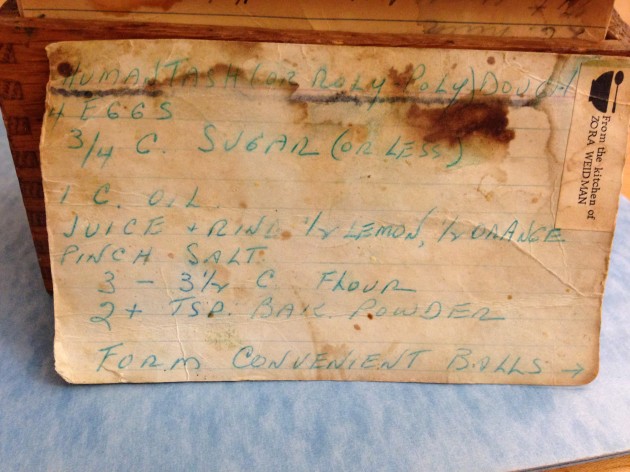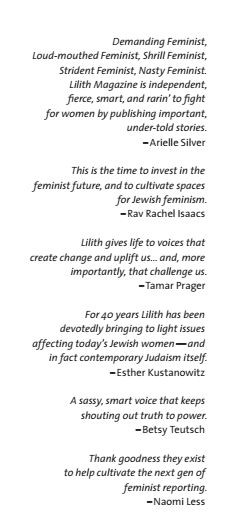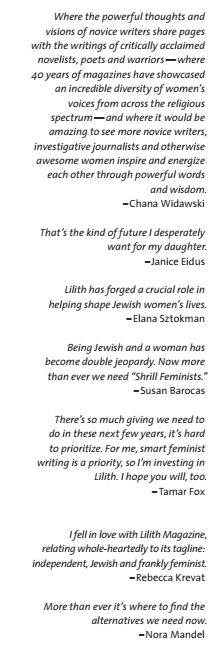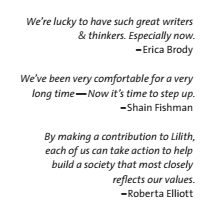Author Archives: Susan Weidman Schneider
February 11, 2019 by Susan Weidman Schneider
Remembering Rela Geffen
Lilith magazine mourns the death of our longtime friend and contributing editor Rela Geffen. A respected sociologist, former president of Baltimore Hebrew University and fearless examiner of gender issues in Jewish life, Rela was also known for her warmth, humor and resilience.
As a result of her doctoral research, she became convinced that for women, birth order was extremely important in predicting career success and accomplishment. Several years ago, before giving a talk to a meeting of high-powered executive women, she came to the podium and asked, “How many of you are first-borns or onlies? Or come from all-girl families?” Almost every hand in the room went up.
- No Comments
September 20, 2018 by Susan Weidman Schneider
When You Say #MeToo, What Dangers Lurk?
We’ve heard a lot recently about becoming an upstander, rather than being a passive bystander when you’ve witnessed a bad event. We’re learning how to defuse a threatening situation on a street or in a crowd, how to offer support on the spot to someone being bullied or harassed.
But now, especially in the wake of Yom Kippur, I’ve been thinking about how we can become attentive to other aspects of wrongdoing or suffering that seem less obvious. We fast and beat our breasts and recite our transgressions and shortcomings each year to improve. And one of those ways is to become more aware of the less obvious needs around us—something that recent trends in feminist activism can help us do.
- No Comments
February 23, 2018 by Susan Weidman Schneider
So You Want To Bake Some Hamantaschen…

My mother, Zora Weidman, made superb hamantaschen. Divine hamantaschen. Excellent at any hour of the day or night. Full disclosure: especially tasty when eaten while reading in bed.
The dough is cookie-ish, not soft, not brittle, and described in the recipe card’s title as “(or roly-poly) dough”—roly-poly being a kind of, umm, rolled-up Winnipeg pastry.
IMHO, my mum’s hamantaschen’s special power was its filling, a mixture of prune, walnuts and citrus peel (likely a combo of orange and lemon) put through one of those large, menacing-looking cast aluminum grinders one cranked by hand. Modern update: I use a Cuisinart, but the mixture comes out a tadgooier than I remember; in Mum’s there were still little distinguishable morsels of nuts, prunes and peel.
Ok, the Sacred, Secret Hamantasch Recipe, transcribed directly from the handwriting of my dear late mother’s recipe card.
- No Comments
December 4, 2017 by Susan Weidman Schneider
Three Weddings and a Statement

Photo credit: Joan Roth
Three couples unable to marry in Israel celebrated their Jewish weddings at Temple Emanu-El in Manhattan Sunday, December 3.
Because of the stranglehold the Orthodox rabbinate has over personal status—marriage, conversion to Judaism and divorce, for example—an Israeli Jew whose conversion to Judaism was not according to Orthodox standards can’t have a Jewish ceremony in Israel. Neither can a lesbian couple. Nor can an egalitarian-minded heterosexual couple who want to avoid the “man buys his wife” construct of the Orthodox ketuba, or marriage certificate.
So, the rabbis at the Reform Temple Emanu-El in Manhattan joined with the Israel Religious Action Center of the Reform movement (yes, the same people you may have seen getting arrested as they try to make prayer services more inclusive at Jerusalem’s Western Wall) to create a Jewish wedding ceremony for three couples, each of whom falls into one of the “forbidden” categories. You can meet them and listen to them tell their stories of love and frustration here.
The event, which included as officiants Reform and Conservative rabbis, was advertised as “Three Weddings & a Statement” and drew about 1500 “guests.” As one of the rabbis present said to those watching from the pews, “You have to be partisans, not [just] witnesses.”
After the six glasses (in white cases) were stomped on and broken by each of the marriage partners (not just by the groom, as is traditional), all the rabbis in the sanctuary—including Modern Orthodox rabbis—were invited up to bless the couples.
These images, by Lilith photographer Joan Roth, capture the strikingly theatrical setting and the joy both of the six celebrants and of the six rabbis marrying them.
- 1 Comment
October 31, 2017 by Susan Weidman Schneider
My Jewish, Canadian Halloween
 Underneath the pirate costume, dug out of the attic, I’m in my brown snowsuit, hood, mittens and all. In the already dusky-dark late afternoon I walk with my grownup (my mother? my Zayde? my much-older brother?) through the snowy air and around the corner to a few nearby neighbors, Jews and non-Jews. I shout gleefully from each front path, “Hallow-een A-pples” at the top of my four-year-old lungs. (The chant’s irresistible combo of anapest and that assertive iamb is so compelling that I can still holler it pretty authentically even now.)
Underneath the pirate costume, dug out of the attic, I’m in my brown snowsuit, hood, mittens and all. In the already dusky-dark late afternoon I walk with my grownup (my mother? my Zayde? my much-older brother?) through the snowy air and around the corner to a few nearby neighbors, Jews and non-Jews. I shout gleefully from each front path, “Hallow-een A-pples” at the top of my four-year-old lungs. (The chant’s irresistible combo of anapest and that assertive iamb is so compelling that I can still holler it pretty authentically even now.)
By October, evening sets in very early in Winnipeg, and what stays with me is the season’s imprint. Instead of looming ghosts and goblins, Halloween and its early dark—and the possibility of snow—plus the adventure of being out in the crisp air, felt very gentle. Growing up, not a single household I knew celebrated what’s now called “Canadian Thanksgiving” (usually the same weekend as Columbus Day in the U.S.), so Halloween is my cool-weather holiday of record.
- No Comments
December 31, 2016 by Susan Weidman Schneider
What To Do Next: A New Year Letter from the Editor
I recall vividly both the JFK assassination and the attacks of 9/11, and a good deal about the emotional response to our current moment feels eerily similar, though no lives have [yet] been lost. The disbelief. The comments that so many feel we should have a shiva ritual for our collective mourning and fear of what’s to come.
As women and as Jews we have experienced enough frightening statements, real threats, vile ideation and a torquing of our expectations these past few months to leave us vertiginous, angry and grieving as toxic strains of misogyny, anti-Semitism, bigotry and bias move rapidly through our world.
- No Comments
December 29, 2016 by Susan Weidman Schneider
Eavesdrop on What They Said to Us
 Dear Lilith Reader,
Dear Lilith Reader,
You know the feeling of whiplash. We do, too.
On the one hand, we’re delighted to open for readers like you a window on Jewish women’s lives you see nowhere else. The magazine’s perspective is feminist, its filter is Jewish, and you tell us again and again that Lilith’s award-winning content is unique and memorable.
On the other hand, this is no time to rest on these or any other laurels, dear reader.
The progress Lilith has helped spur in 40 years of fearless writing, and the changes the magazine has witnessed and helped bring about—both in Jewish life and the world at large — has got to keep on keeping on. A toxic blend of misogyny and anti-Semitism is on the rise. More than ever, we need to nurture the next generation of women to engage actively in feminist reporting and nuanced writing on the women’s issues — those human issues — that matter most to us.
Help Lilith continue to publish stories about everything from rabbinic sexual misconduct to radical Jewish women from the 1880s, from genderfluid teens to why Jews have a special stake in reproductive rights.
 We appreciate the enthusiastic voices you’re hearing in this letter, from Lilith readers like you who state frankly: We Need More of This! More voices, more unusual perspectives, more good writing and thinking to help us all make sense of what’s coming next. Your support is needed now more than ever as women face dragons we couldn’t have predicted would again need confronting 40 years after Lilith’s launch.
We appreciate the enthusiastic voices you’re hearing in this letter, from Lilith readers like you who state frankly: We Need More of This! More voices, more unusual perspectives, more good writing and thinking to help us all make sense of what’s coming next. Your support is needed now more than ever as women face dragons we couldn’t have predicted would again need confronting 40 years after Lilith’s launch.
That’s why Lilith invites you to help fund a feminist future. I trust you will be part of insuring that future by contributing to Lilith today. Women like us—you and me—need Lilith’s inclusive, big-tent Judaism and feminism now more urgently than ever.
Your support will sustain Lilith’s work and women’s rights. Rights like respect for women’s aspirations and our bodies, access to safe and legal abortion care and the freedom to worship where and how we choose.
You’re hearing from a wide spectrum of women in this letter telling their friends online about Lilith and why they support this magazine’s crucial work. I hope you’ll do as they did, and give as generously as you can right now.
Because in addition to publishing the award-winning writing and cutting-edge thinking in the print magazine, Lilith is a matrix for emerging writers and thinkers on the Lilith blog, and face-to-face in intergenerational Lilith “salon” groups meeting around the world. Lilith has proudly crafted — some say invented — the banner of Jewish feminism. In Lilith, you see women’s issues through a Jewish lens and Jewish concerns through our unique feminist filter. Lilith inspires action and—importantly—empathetic understanding of lives like and unlike your own.
Your support helps make possible groundbreaking reporting, like these recent pieces:
The paradoxical experiences of a volunteer who returned to her father’s Vienna (from which he was expelled by the Nazis) to help feed and clothe its Syrian refugees.
Feminist therapists on what keeps Israeli women less fulfilled in bed, in a cover story on “Sex in the Promised Land.”
The challenges a lesbian couple face as they search out a welcoming Jewish school for their two sons; “we don’t want them to be tokens.”
Stepmothers! Throwing back the cape to reveal the misogyny behind the sinister stereo- type! Add to the mix religious differences, just to spice up the blended family.
“Why the Jewish Community Should Fund Fertility,” a poignant call for IVF and adoption support; this may be better for the Jews than sending students on free trips to Israel, argues the author.
How a Moroccan Jew merges her identities — and her words — in “Choosing Which Language to Live In.”
Read the first-hand struggle against the prejudices that a twenty-something Jewish woman who uses a scooter and an oxygen tank faces as she confronts barriers both social and physical in her Jewish world
 How will Lilith continue to nurture new voices as well as writers like these? The support you give now will help Lilith to discover, teach and nurture a new generation of trouble- makers, nasty women, strident women—all of them terrific writers and incisive reporters. And you’ll be able to read more of their work at Lilith in print and online.
How will Lilith continue to nurture new voices as well as writers like these? The support you give now will help Lilith to discover, teach and nurture a new generation of trouble- makers, nasty women, strident women—all of them terrific writers and incisive reporters. And you’ll be able to read more of their work at Lilith in print and online.
Many, many thanks for helping Lilith create a viable feminist future.
Susan Weidman Schneider
P.S. Please give generously now, so that Lilith can recruit the next generation of iconoclasts.
- No Comments
December 14, 2016 by Susan Weidman Schneider
You’re the Chief Procurement Officer of Your Life
 A large screen shows a small girl whose skin shimmers. She is standing outside of a “rat hole” mine for mica. “The sparkle in lipstick, in nail polish” comes in part from her labor, Justin Dillon, founder/CEO of Made in a Free World, announces to the Jewish women philanthropists.
A large screen shows a small girl whose skin shimmers. She is standing outside of a “rat hole” mine for mica. “The sparkle in lipstick, in nail polish” comes in part from her labor, Justin Dillon, founder/CEO of Made in a Free World, announces to the Jewish women philanthropists.
Another story mentions a five-year-old boy who works diving for fish. If he surfaces too quickly, to breathe, he is beaten on the head with a wooden oar.
Dillon is speaking about slavery and human trafficking to the Lions of Judah, Jewish women philanthropists from around the world who are gathered at their conference, “Hear Us Roar” in Washington, D.C., in 2016. Susan Stern, past chair of National Women’s Philanthropy of the Jewish Federations of North America, describes the participants to the speakers in this session as “the top women philanthropists in the world. They happen to be Jewish.”
“There are huge profits from slavery, so charity alone won’t make a dent,” said Dillon, who has been tasked by the government to “purify the government supply chain,” making sure that none of its suppliers use trafficked labor, “making sure that there isn’t slave labor going into farming the fish. You are the chief procurement officer in your life — with every transaction think about who makes what you’re buying.” Stern added that the atrocities of human trafficking and sex trafficking were very profitable because of the demand for consumer sex and ever cheaper consumer goods.
Lilith asked, “How can intervention occur? What do you say if you suspect that someone brought in by a third party to clean your house or rake your leaves might be a labor slave?” Susan Stern replied, “I ask in the nail salon: ‘Where do you go at night? Do you ever go to the movies?’ in order to give people an opening to say a little bit about their lives.” Stern also suggested hotline stickers in “every synagogue bathroom, every summer camp bathroom, because camping brings in foreign counselors and you want to make sure they’re protected.”
Amelia Dornbush also contributed to this article.
The views and opinions expressed in this article are the author’s own and do not necessarily reflect those of Lilith Magazine.
- No Comments
November 10, 2016 by Susan Weidman Schneider
A Post-Election Message from Lilith
 On Monday, lots of you pledged to advocate for a feminist agenda on November 9 and beyond. Some also wrote us to reveal why they were signing on. “Because Jewish tradition tells us that we must ensure we are counted and accountable.” “Our voices must be loud and clear.” And “the struggle is not over.”
On Monday, lots of you pledged to advocate for a feminist agenda on November 9 and beyond. Some also wrote us to reveal why they were signing on. “Because Jewish tradition tells us that we must ensure we are counted and accountable.” “Our voices must be loud and clear.” And “the struggle is not over.”
After the U.S. presidential election on November 8, women urgently posted, emailed and phoned their friends with some variant on this anxiety: “I’m afraid women will lose the right to decide what happens to our own bodies.” And afraid that some people they know and love will be sent away, deported. Afraid as Jews, because anti-Semitism unleashed during the election season echoes what we’ve seen before.
- No Comments
March 30, 2015 by Susan Weidman Schneider
Food: Gender, Power and More
Food—yum!—opens us up to similarity and diversity, generosity and self-interest, gender and power. So naturally Lilith’s readers are interested.
Passover is the holiday with the most relentless attention to foods, and to the memories they conjure. But it’s also about the politics of the kitchen—about similarity and diversity, gender and power. Each choice we make can stake out a spiritual, ideological or political position.
For me, it’s also often about phone conversations, since so many of the people I like to connect with—near and far––are cooking at the same time.
When the phone rang with a graduate student on the other end, I was surprised. Not by the call, since we get queries all the time at Lilith, but by what she wanted to know. Could she interrogate me about Lilith’s reporting on food? In her research into feminist publications, Lilith had emerged as an outlier. Why was this magazine the only one with a positive view of cooking? All others viewed food as a tool for oppressing women or as a toxic substance triggering eating disorders.
- No Comments
 Please wait...
Please wait...